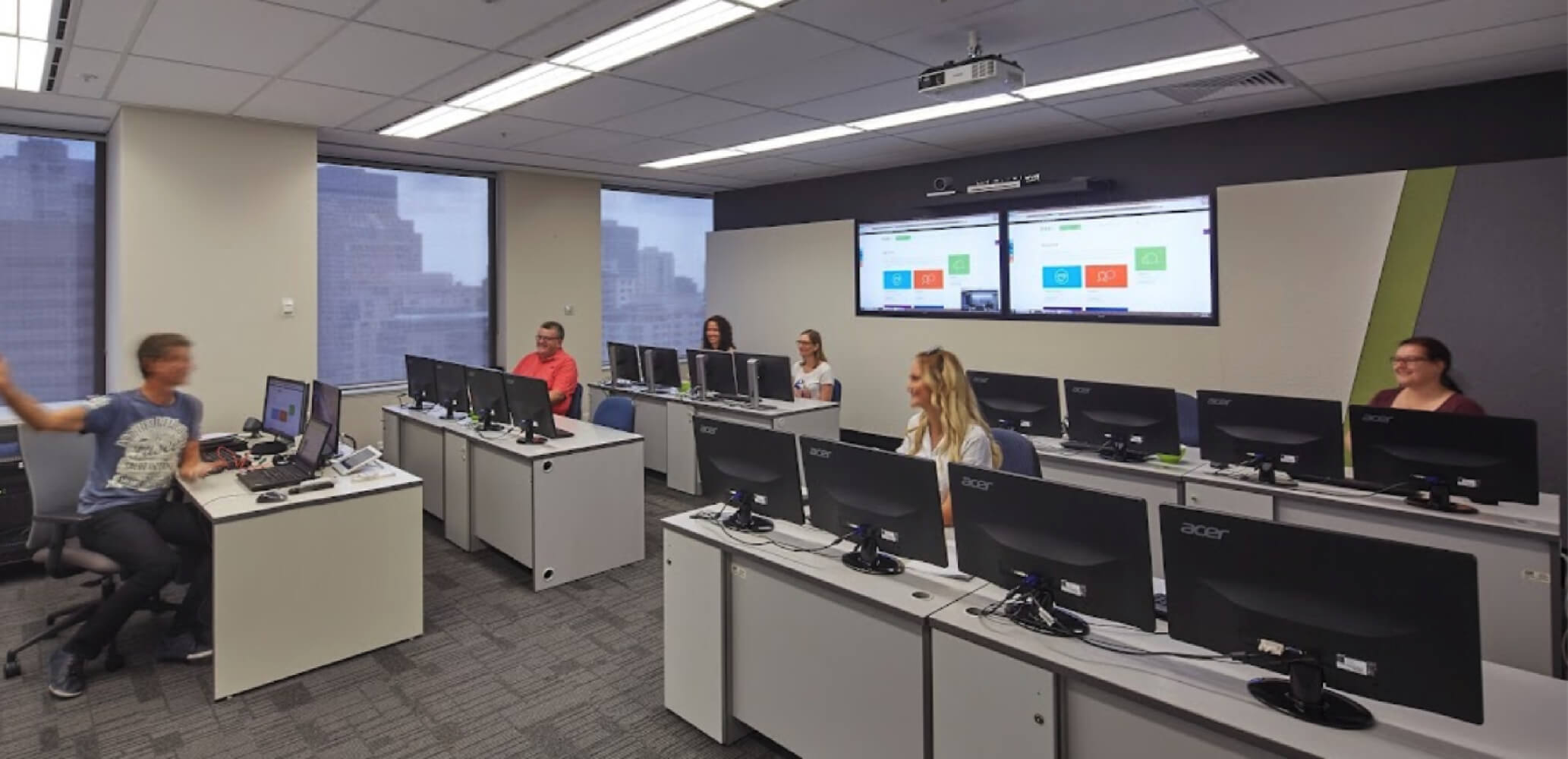Software Development Powers the World
A software developer is a professional skilled in designing and building computer programs and applications. Becoming a software developer requires a mastery of various technical skills in computer programming.
A career in this field can be physically and mentally taxing, but it is lucrative and rewarding. In today's world, a software developer is relevant in almost every industry, sector, and area of life.
Becoming a software developer requires acquiring relevant technical skills, getting qualifications/certifications, and developing soft skills.
This article will provide you with fundamental knowledge about the software developer career path, step-by-step guidance on becoming a software developer, and landing your first software developer job.
Let’s dig in!
What is a software developer?
A software developer is an expert that builds, designs, maintains, and deploys specific computer applications. Some developers specialise in developing mobile and desktop applications, while others build operating systems.
Being a software developer involves:
- Writing and implementing efficient code.
- Designing and building software programs and applications.
- Analysing, testing, and deploying new programs.
- Modifying and adjusting existing programs.
- Improving the performance of applications.
There are different kinds of software developers who focus on specific aspects of the development of an application. However, they all work hand-in-hand to ensure the project has a successful outcome.
- Backend developers
Backend developers mainly work on the aspect of the product that cannot be seen or accessed by a user. They focus on the server side of the application development and work on the complex infrastructure of a programme, website, or application. They work hand-in-hand with front-end developers to ensure the smooth running of the application.
- Frontend developers
They work on developing the user interface of websites and applications using several coding languages such as JavaScript, HTML, and CSS. They work on the aspect users interact with directly and are involved in creating the interactive elements. It is the client side of development.
- Fullstack developers
Fullstack developers are experts in the front end and back end of an application’s development. They are proficient in the programming languages required in both aspects of development.
- Mobile Developer
Mobile developers specialise in creating, designing, and developing applications that run on mobile devices such as tablets, handheld devices, and smartphones. They ensure the cohesiveness between a mobile application's functional and technical sides. Becoming a mobile developer will usually require a specialty in either IOS or android development, but some will specialize in both.
- Web developer
As the name implies, web developers focus on creating and developing websites. They can either be backend developers, frontend, or full-stack developers.
- Database Developer
Database developers build, design, and program databases to fulfill an organisation's information needs. They are responsible for analysing the performance of the database to make appropriate modifications and adjustments for seamless functionality.
Common projects of software developers
- Web apps
- Mobile apps
- Games
- E-commerce platforms
- Social media platforms
- Content management system
Salary of a software developer
Seek reported that the average annual salary of a software developer in Australia is from $90,000 to $110,000. However, the salary also varies according to industry, state, and years of experience.
Tasks and duties of a Software Developer
- Troubleshooting and fixing bugs in existing software.
- Consulting and collaborating with the management and customers to identify user requirements.
- Writing and testing code.
- Integrating existing applications and testing their compatibility with platforms.
Requirements to become a software developer
Becoming a software developer requires certain traits, qualifications, and experiences.
Traits
- Strong analytical mind.
- Excellent problem-solving skills.
- Ability to efficiently multitask.
- Excellent communication skills.
- Being detail-oriented.
- Creativity and critical thinking.
- A good team playing spirit.
- A quest for knowledge.
- Quick learner.
Qualifications
- A degree in IT, Computer Science, or other related fields.
- Relevant certifications from reputable software development education platforms, including Google, Nexacu, Microsoft, and IBM.
Experience
- Proficient in various coding languages.
- Years of experience in developing web and mobile applications.
- Testing and debugging knowledge.
- Solid knowledge of the software development cycle.
- Experienced in working in a team.
How to become a software developer
A software developer's career requires specific pathways to turn the dream into reality. Here are 10 steps to consider:
Get a degree or take online courses
Obtaining an undergraduate or master's degree in Computer Science or a related field is one way of starting this career. It is useful to have, but not compulsory.
However, it will give you the basic technical knowledge you need to dive deeper into software development.
And because it is a highly competitive field, the degree will give you an edge in the job market.
If you don't have the adequate time and resources to pursue a degree, you can attend a coding Bootcamp. These boot camps take about 3-6 months or even less.
You can also take the self-taught learning route by taking online courses for software developers from credible tech education platforms. Some of the courses are free, cheap, and flexible. You need dedication, discipline, and time management to excel.
In a 2021 report by Stack Overflow, over 10% of developers learned how to code through Bootcamp, while almost 60% did so through online resources.
Learn a programming language
Learn popular programming languages such as
- Python
The scripting language can be extended to various areas such as data analysis, machine learning, software development, and web development (server-side). Taking a Python course will give you a great foundation in your career.
- Java
Java is a popular programming language for developing desktop and mobile applications. Learning Java is easy because natural language is a large aspect of the platform.
- JavaScript
This is used for the frontside development of web applications to make them interactive. It is a flexible language for beginners.
- C
C is a programming language for various applications, including databases, operating systems, and compilers.
- C++
C++ is a subset of C. It is also a general-purpose programming language for developing browsers and operating systems.
- PHP
PHP, personal Homepage, is a general-purpose server-side programming language used by software developers for web development and other projects. It is an easy-to-learn language for beginners with no technical knowledge.
- SQL
SQL stands for Structured Query Language. It employs the use of a straightforward language structure which makes it easy to learn. Taking an SQL course is a good place to start if you are interested in managing databases.
- R programming
R programming is an open-source programming language used in statistical computing and analysis. If this area interests you, consider taking R Programming courses.
Constant practice
To sharpen your skills, keep practicing what you have learned. Take on a personal project that interests you.
Join a community
Joining a community of learners with shared interests will help improve your commitment to this journey. They will serve as motivators and accountability partners.
Choose a niche
It would be best to decide on the software development niche you want to specialize in and the industry you want to work. This will make it easier to determine the kind of training and experience you need.
Gain hands-on experience
The only way to sharpen your skills is by gaining hands-on experience. Search for volunteering opportunities, apply for internships, or start a personal project. You can design an app or build a website.
Build your soft skills
While gaining experience in the field, it is vital to build your soft skills. Software development may require technical skills, but your soft skills will make you go far.
Some skills you will need in this career include effective communication, problem-solving, and attention to detail.
Get certifications
Software development is a highly competitive field. You will need credible certifications such as Google, Nexacu, Microsoft, and IBM to have the edge over other applicants. It will make it easier for the potential employer to confirm your experience in the field.
Create a professional portfolio
You can compile a professional portfolio from your internship, volunteering, and personal projects. This will be the evidence employers will need to know you have the relevant skills and experience to work with them.
You can design your own website to showcase your skills or use hosting services such as Github, GitLab, Google Cloud Source Repositories, and AWS CodeCommmit.
Apply for jobs
Securing a software developer job will require you to be proactive in your job search. Update your resume to reflect your skills and experiences and optimise your LinkedIn page. If you do not have an account, now is the right time to create one and start increasing your visibility.
Opportunities for advancement
To give yourself the best possible opportunity to succeed, it is recommended you do the following:
- Network with industry professionals.
- Join a community of software developers to learn from them and share ideas and opportunities.
- Leverage social media to build your personal brand.
- Attend tech conferences and events.
- The technology industry is fast paced. Therefore, you need to update your knowledge by constantly upskilling and reskilling.
Similar careers
There are software development-related careers you should consider dabbling in if you want to pivot into other areas or start up from somewhere.
Software engineering
Software development is an aspect of software engineering. Some people use software developer and software engineering interchangeably, but they are not the same, although they share many similarities.
While software development focuses on creating and modifying specific systems and applications, a software engineer designs and develops the entire computer system and applications.
Technical support engineer
A technical support expert helps to troubleshoot, detect, identify, and resolve system issues.
Site reliability engineer
They help in resolving critical issues that come up during the production process. In addition, they develop systems and software that help to improve site reliability and performance.
Database administrator
They are responsible for handling security scaling, provisioning, and optimizing low-level data storage systems. This will require knowledge of SQL. It is a good place to start for beginners. Our 'How to become a database administrator' article will help you determine if this is the right career for you.
Software developers are professionals responsible for designing, building, and managing software programs and applications.
They perform various roles in an organisation, including writing and testing code, integrating existing applications and testing their compatibility with platforms, troubleshooting, and fixing bugs in existing software.
To start a career in this field, you must acquire the necessary software developer qualifications to help you excel.
Earn a degree, learn how to code, define your career path, sharpen your skills, acquire certifications, and gain relevant experiences.
Get started in your software developer career path by checking out these online courses to learn a tech skill today!


























